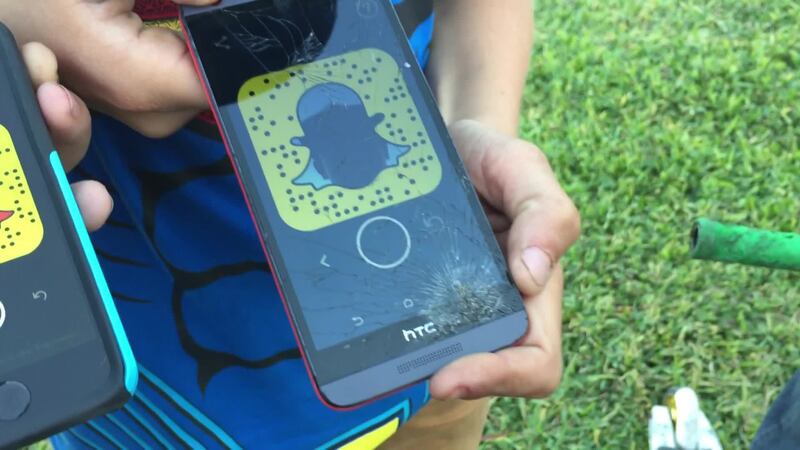The celebrity cases make headlines.
Singer Christina Grimmie, who found fame on YouTube and "The Voice,” was shot and killed in 2016 by a man she did not know was stalking her online. "NCIS" actress Pauley Perrette says she lives in fear every day that the person who has stalked her online for more than a decade, will physically harm her.
RELATED: What is cyberstalking?
But it doesn’t just happen to the famous. Virtually anyone can become a victim of cyber-stalking. A 2016 report from the Data & Society Research Institute finds that most U.S. internet users have witnessed online harassment.
Thirty-six have experienced direct harassment like being called offensive names, being physically threatened or being stalked.
One of those is Julie Williams, PhD, a psychology professor at Wright State University. In 2013, someone complained to the university that Williams was body-shaming a famous singer on Facebook.
NEWSLETTER: Sign up and get the stories you miss overnight in the Morning Brief
"I was just floored, shocked, anxious,” said Williams.
She did not even have a Facebook account. In fact, Williams needed help to get into the Facebook portal to have the post taken down, which took three days. But her cyber-stalker persisted and even created a fake Facebook page with her name and some pictures of her from Wright State University’s website. The page contained racial slurs, pornographic videos, and mocked disabled people. That was ironic and sad, since Williams is a little person.
“I’m no stranger to bullying,” Williams said.
But nothing has caused her the emotional distress like the creepy images posted on the site her stalker created. One photo shows Williams’ head on a child’s body sitting on a dog.
RELATED: Guilty plea by man accused of cyberstalking sheriff
"It’s disturbing to see your body taken apart and put like that,” she said choking back tears.
Williams said she has repeatedly gone to Facebook and proven her identity to have the false posts taken down. She said it is time-consuming, emotionally draining and disruptive to her work.
"Every time it happens, you don’t get the luxury to walk away from it. You have to stop everything you are doing and deal with it,” Williams said.
She has filed police reports with two departments and said efforts have been made to trace the I-P address but it is gone by the time they can get a court order. More recently, her contact information from Wright State’s website has been posted on two dating sites. She has received emails and phone calls from men wanting to meet her.
“They have your number. They know what you do and where you do that work and you didn’t invite that. That’s frightening,” said Williams.
Though her stalker has not threatened violence, she has sought help for her safety from a victim advocate. Susan Gottschalk is the Director of the Family Violence Collaborative with the Artemis Center. She believes the person stalking Williams could incite other people to anger.
“This man or woman has been doing this since 2013," Gottschalk said. "Someone who is that obsessed for that long is really a very dangerous individual.”
Another area woman targeted by an online stalker was reluctant to give her name out of fear for her safety. She installed security cameras outside her home in case her stalker decided to pay her a visit.
This woman has kept a timeline which goes back nearly two years and she has filed lengthy police reports. A Letter to her from her city’s police chief called harassment on social media "a growing concern we do not take lightly.” However, no charges have been filed even though she knows who is stalking her.
Gottschalk and other victim advocates believe most police departments lack the training and resources to track cyber-stalkers.
Vicki Angelopoulos heads up the Cyber Crimes Unit at the Ohio Bureau of Criminal Investigation. She says her unit’s computer forensic specialists can assist law enforcement in retrieving information from cell phones and social media sites.
"As long as you can obtain a subpoena or search warrant, the subpoena for the account information and the search warrant for the content of what is on that site, then you can retrieve it,” she said.
Julie Williams hopes investigators take advantage of those resources, not just for her, but for all victims.
"The more we allow this to continue, the more we’re allowing a sickness to spread,” Williams said.
IF SOMEONE IS STALKING YOU ONLINE, EXPERTS SAY:
- DO NOT RESPOND OR INITIATE CONTACT WITH THE PERSON, ONCE YOU'VE TOLD THEM TO STOP.
- FILE A POLICE REPORT.
- KEEP A RECORD OR LOG OF EACH CONTACT.
- SAVE ALL EMAILS, TEXT MESSAGES, PHOTOS, AND SOCIAL MEDIA POSTS.
- GET CONNECTED WITH A LOCAL VICTIM ADVOCATE.






